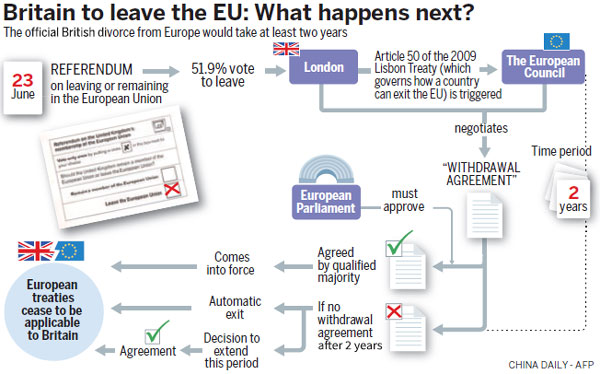Brexit sends shivers through global markets
By HARVEY MORRIS in London and WANG QINGYUN in Beijing (China Daily) Updated: 2016-06-25 07:40
China may have to review its policymaking toward both the UK and European Union
If China had been given a vote in the UK referendum on Britain's membership in the 28-nation European Union, it may have voted to stay in. The British electorate, however, chose the Brexit option, sending shivers through international markets.
Chinese shares slipped by 1 percent, reflecting a general global concern about the consequences of the UK vote. The volatility is sure to settle. Economies as large as those of China or the US can cope with the difficulties of their European partner.
Britain's exit from the EU is nevertheless a setback for trading partners who saw the country as the gateway to a market of more than half a billion people. President Xi Jinping's visit to Britain last year, a trip that included ceremonial pomp and a banquet with Queen Elizabeth II, reflected not only the UK's importance as the world's fifth-largest economy but also its role as a key member of the EU.
After this week's vote, British Prime Minister David Cameron, who hosted Xi in such an atmosphere of optimism in October, announced he would quit.
Chinese experts have mixed views on what impact the Brexit will have on China.
Cui Hongjian, director of the Department for European Studies at the China Institute of International Studies, said China needs to review its policymaking toward both the UK and the EU.
China may need not only to review the UK's potential for investment if it no longer serves as a "through train" to the EU market, but also to see if the UK's departure will make the EU more conservative and protectionism-inclined, Cui said.
|
Brexit supporters wave British flags outside Downing Street in London on Friday after the referendum result was announced. Neil Hall / Reuters |
The British market's openness to Chinese investment "is currently unseen on the European mainland", Cui said. "We had intended to hold up China-UK relations as an example for (the development of the) China-EU relations. But there is less reason to do so now. China doesn't want to see other countries follow suit," he said.
Britain has been the top European destination for Chinese investment, with $30 billion in investments and contracts in the decade from 2005.
Ma Zhengang, a former Chinese ambassador to the UK, said he doesn't see the Brexit having any direct, short-term impact on China but he is concerned about whether the move will shake the UK's position as the world's financial center.
If it does, "this might have an influence on China, as ... the UK is one of the offshore markets for the renminbi," he said.
Chen Xin, a researcher at the Institute of European Studies at the Chinese Academy of Social Sciences, said the Brexit will cause fluctuations in China's stock and currency markets, but they won't be as pronounced as in the EU and the United States, which have much closer economic and trade ties with the UK.
The Brexit debate made few waves among the Asian public. However, the prospect of Britain's departure from the European bloc, China's biggest trading partner, unsettled the leaders of its Asian partners.
China is not alone in fearing the Brexit will precipitate a breakup of the EU, where other governments are also facing challenges from populist movements agitating against membership of the bloc.
The concerns do not merely involve trade. Beijing wonders whether the EU minus Britain might represent less of a counterweight in resolving international tensions, including those with the US.





